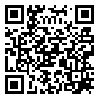Volume 2, Issue 2 (7-2014)
jmsthums 2014, 2(2): 25-30 |
Back to browse issues page
Abbas Ghodrati torbati 
 1, Sedgheh Abaspoor1
1, Sedgheh Abaspoor1 
 , Majid Hasanzadeh1
, Majid Hasanzadeh1 
 , Mohamad reza Mishmast1
, Mohamad reza Mishmast1 
 , Elahe Erami1
, Elahe Erami1 
 , Zohreh Zandi1
, Zohreh Zandi1 


 1, Sedgheh Abaspoor1
1, Sedgheh Abaspoor1 
 , Majid Hasanzadeh1
, Majid Hasanzadeh1 
 , Mohamad reza Mishmast1
, Mohamad reza Mishmast1 
 , Elahe Erami1
, Elahe Erami1 
 , Zohreh Zandi1
, Zohreh Zandi1 

1- Torbat Heydariyeh University of Medical Sciences
Abstract: (14127 Views)
Background and Aims: Premature baby mothers are more anxious than other parents. High levels of anxiety change the interactions between mother and baby and have negative consequences which cause anxiety disorders and cause their parents to fail to play their roles well. This anxiety can be effective on the growth of baby. Therefore, this study was conducted to control their anxiety and to provide training for them.
Materials and Methods: This study was a clinical trial study (code: 18035N1) on 50 primiparous mothers with premature infants at Nohom DeyHospital of Torbat Heydariyeh . The simple random method assigned to experimental and control groups. The tool was Spielberger anxiety questioner. One day after being admitted to the newborn, neonatal care, was given to intervention group in 45 to 60 minutes. Mothers’ level of anxiety was collected two times, 24 hours after admission (pretest) and at discharge from the neonatal unit (post-test) and the results were analyzed through chi-square and t-test.
Results: In demographic variables there was no significant difference between the two groups (p < 0/005). Before the intervention, the mean anxiety scores in intervention group and control group were 63/67 ±8/32 and 58/17±10/03, respectively. There was no significant difference (p = 0/431) while the mean anxiety scores after the intervention in intervention group and control group were 29/41±9/06 and 67/15±12/3 (p = 0/002), respectively.
Conclusion: The present study showed that infant care training reduces anxiety in mothers of preterm infants, so this strategy can be applied by the authorities to reduce the consequences of the problem caused by this anxiety for mother and baby
Type of Study: Research |
Subject:
Special
Received: 2014/06/4 | Accepted: 2014/09/17 | Published: 2015/06/25
Received: 2014/06/4 | Accepted: 2014/09/17 | Published: 2015/06/25
| Rights and permissions | |
 | This work is licensed under a Creative Commons Attribution-NonCommercial 4.0 International License. |
